- Home
- Tom Stoppard
Lord Malquist & Mr. Moon Page 5
Lord Malquist & Mr. Moon Read online
Page 5
‘That lady then – Mrs Boswell, is she?’
‘Moon.’
‘Odd fellow, Boswell, would you say?’
‘How do you mean?’
‘Him with the clothes, odd fellow.’
‘His name’s Malquist. Earl of Malquist. He’s a lord, you see. I’m working for him.’
‘Your boss.’
‘Client.’
The Risen Christ pushed aside the empty pan, wiped his mouth on his robe, looked sly-eyed at Moon and wrote off nearly two thousand years of Pauline dogma with a single observation: ‘That Lady Whosis, I wouldn’t kick her out of bed.’
That’s no lady that’s my—
‘She’s my wife actually,’ said Moon without rancour.
‘Your wife?’
‘Yes.’
Moon watched the Risen Christ struggling to fit this information into the scheme of things.
‘I hope I didn’t offend your lordship.’
‘That’s quite all right.’
‘It was the devil in me talking right enough. It’s a testing you see. I’m being tested all the time.’
‘I’m not a lord,’ said Moon. ‘My name is Moon.’
A thought struck him.
‘What’s your name?’
‘Jesus.’
One-love to the Risen Christ.
Good loser Moon smiled at him. There was a version of that knock-knock joke.
Knock-knock!
Who’s there?
Jesus.
Jesus who?
Jesus WHO?!
Moon liked telling himself jokes. He particularly liked it in dialogue.
‘Jesus who?’
‘Jesus who?!
The Risen Christ hit just the right note of pained incredulity. But Moon still liked it better taking both parts.
The Risen Christ asked, ‘What about them cowboys tarry-ranting about?’
‘What about them?’
‘Bit odd, isn’t it?’
‘Is it?’
Of course it is, of course it is, you know it is.
‘What about you then,’ he countered, ‘going about on a donkey dressed like that?’
‘What about it?’ asked the Risen Christ.
‘Odd.’
‘Not to me.’
Perhaps that was the answer. He would file it away for the future. My whole life is waiting for the questions to which I have prepared answers, and looking for the answer to the overwhelming question … Oh do not ask what is it, let us go and make our visit.
Moon walked out of the kitchen and down the hall to the drawing-room and opened the door. The room was getting dark but the lights had not been turned on. Jane was sprawled over the chesterfield with her dress pulled up to her bust and Lord Malquist was bent over her to scrutinise her stomach. Jane put her finger to her lips but Moon had nothing to say. The ninth earl was engrossed-in her navel, Moon realised.
‘I don’t think you’re the bookworm type,’ murmured the ninth earl. ‘I’d say you were more of an extravert.’
‘That’s true, that’s true,’ Jane said.
‘I don’t think your childhood was an entirely happy one,’ the ninth earl continued. ‘I don’t see any brothers or sisters but I might be wrong’ – (‘I had a big brother but he died,’ Jane said) – ‘You’ve been abroad and I think you’ll be going again.’
‘Isn’t he marvellous?’ said Jane.
The ninth earl took out a slim gold pencil and inserted the pointed end into her navel, flattening one of its creases.
‘Yes, yes … I see a certain amount of unfulfilment here – you don’t feel that your qualities as a woman have been recognised … You are generous but like to get your money’s worth … You feel that you could be a real friend to many but suspect that most of your friends are superficial, and you save yourself for a chosen few … I foresee a long and eventful life.’
He straightened up and put the pencil back into his pocket.
Jane bounced herself on the chesterfield.
‘That was lovely, darling. Now let me tell yours.’
‘I’m exceedingly sorry, my dear, but to you it would be just another navel.’
Jane pouted, ‘I don’t know quite what you mean by that.’
‘I don’t know quite what I mean by anything. Ah, dear boy. Have you got your book with you? Do bring it, you’re missing some frightfully good stuff.’
I don’t care, I simply don’t care.
Jane stood up and pulled her dress down.
‘Very good, Lord Malquist,’ Moon said. His notebook was in the coach. He walked out closing the door but his hand was still on the china knob when he realised what it was that had made his brain signal incompletion. He went back into the room.
‘Certainly not, dear lady,’ the ninth earl was saying, ‘without them I would look just like anyone else.’
They looked at him enquiringly. Moon took no notice. He knelt on the carpet, put his cheek to its fuzz and spoke into the dark under the chesterfield.
‘Marie.’
He could see her lying there.
‘It’s all right now. You can come out.’
Moon got to his feet.
‘She’s very shy,’ he said.
Lord Malquist tapped him on the shoulder with his ebony stick.
‘Do you mean to say that that trembling birdlike creature still cowers in the undergrowth? Mam’selle! Come forth, the enemy has fled!’
They listened. Moon thought he heard her breathing.
Jane said crossly, ‘So! The little bitch!’ She picked up the nearest object – a china sheepdog – and seemed about to throw it quite arbitrarily at the wall. ‘I knew she was a voyeur at heart, she had absolutely no right.’
‘My dear Jane, we were sitting right on top of her. She could not possibly have seen anything to afford her any gratification, unless she’s a foot-fetishist.’
‘She was listening,’ said Jane.
‘An ecouteuse! What a deliciously subtle refinement!’ He took a pace back, tilted his stick and addressed himself elegantly to the couch. ‘My dear mademoiselle, allow me to establish you in St John’s Wood behind high box hedges with your personal staff and ten thousand pounds a year. I shall visit you anonymously in my sun-coloured coach-and-pair, and punt you parasol-ed across the Serpentine while I peep for a glimpse of your garter, ah yes, we shall have a box at the theatre, you and I, and in the plum-coloured dark of plush and passion I shall feed you sugared almonds, recline with you in the dimmest recess and crumple your gardenia…’
The sheepdog smashed against the wall over the fireplace, and Moon left the room.
The front door was still open and outside the evening had come quickly, bleeding the colour out of the coach.
‘O’Hara?’
‘Hello!’
‘Hello.’
The greys were each other’s shadow on the wall.
‘It’s all right,’ said Moon.
‘What is?’
He’s got me there.
Moon opened the door of the coach and climbed in. He felt around the seat and then climbed down again and asked O’Hara for a light. O’Hara lowered himself over the side.
Moon saw him as a density against the coach, lacking outline, shadowed in shadow, a hat and a cloak letting themselves down from the high box seat. Just then the streetlights ignited themselves, suggesting a ping too high for the human ear. Pink filament infused their waxen coldness with the promise of light. O’Hara’s toe stretched for the ground and as he turned on it Moon saw his face, broad, negroid, black.
‘O’Hara…’
‘Here.’
Moon looked at him and regained his balance. He tried to remember when he had last seen O’Hara, whether he had seen him at all. He had got from somewhere a mental image of O’Hara’s face – Irish, boozy and fat. Had he made it up? For the hundredth time in his short memory another trick had been played on him.
His irritation transferred itself to the remark, ‘What do you
make of it, O’Hara?’
‘A schlemiel let me tell you.’
‘What?’
‘O’Hara, I ask myself, what does she vhant?’
‘Who?’
‘Running she was, did I see her? – no!’
Moon saw her lying in Pall Mall, humped, limbless, un-moving (A lady does not move). He knew why he felt relieved. If she had tried to crawl he would have carried her crawling through his mind until she had been replaced by fresher demons.
‘I don’t understand it,’ Moon said.
‘I ask myself. A loon maybe.’
That was possible, whom ever it applied to. Madness was the ultimate rationalisation of the private view. He tried to apply it to the day’s betrayals but they were too diverse.
‘It’s been a long day,’ Moon said.
‘Probably.’
O’Hara struck a match. It flared against the black moon of his face, tired tiger eyes slipped around on smoked-yellow glaze.
‘Thank you, I don’t smoke.’
The match went out. They stood together uncertainly in the cold near-dark.
The art of conversation has left me behind. I’m a reactionary. It’s been a long day. Probably.
‘What’s your name, O’Hara, your Christian name?’
‘Abendigo.’
‘You’re a convert?’
‘My whole life I am a convert.’
Moon felt trapped in a complex of shifts-words spoken, overtures made, acts performed – that were not getting him anywhere. The initiative had been taken away from him and he was being edged towards panic-he’d had the feeling before, in countless variations – it was like – yes, when he was a boy, in winter, in the games room, after football – his head and trunk were inside a thick knitted sweater that was too tight for him and he was trying to find his way out of it but he couldn’t find the arm-holes, and everywhere he pushed his fist the wool strained against it and his muscles got tired and he couldn’t find the neck-hole now and he would die in there if he didn’t make his own, destroy—
‘How long have you been a nigger, O’Hara?’
O’Hara grinned and cocked his head low like a great happy piano-player, and moved away.
Moon shouted, ‘You sly bastard-you didn’t tell me you were a nigger, did you? – you let me see your Irish drunkard’s face and didn’t tell me. How long has it been going on, O’Hara? Does Lord Malquist know you’re black-does he? Why have you gone black on me, O’Hara?’
O’Hara started to heave himself up the side of the coach.
Moon shouted recklessly, ‘And you’re not Jewish either!’
‘I told you already.’
Moon reeled away to surer ground – ‘Stick to your own kind, O’Hara, get back to the jungle and leave our women alone! I know you, I know what you’re up to! You keep chickens in the coalshed and urinate on the landings-you talk loudly on buses, don’t you O’Hara? Oh yes, I’ve got your number-you take over our jobs and spread VD through the schools and peddle drugs which you buy on your immoral earnings – oh yes, you don’t pass for white with me, you know – I’ve heard your slave songs, O’Hara, I’ve heard you all right and I’m not taken in I can tell you – Because I don’t think you’re so virile at all, it’s just a myth, O’Hara, and if you want to know what I think, I think your sense of rhythm is bloody awful – so get out and stop persecuting me, you’ve only come here for the National Health!’
Moon crawled weeping into the leather-smell dark of the coach, and huddled on the floor.
I clutch at straws but what good’s a brick to a drowning man?
After a while he stopped crying. He found his notebook under him. He put it in his pocket and climbed down into the cold air. When he tried to speak his voice cracked. He wiped his sleeve over his eyes and peered up at the coachman blotted against the dirty grey wash of the sky.
‘I say,’ he repented. ‘O’Hara.’
‘Hello.’ O’Hara sat up on his box piping smoke.
‘I’m sorry, I didn’t mean – you caught me off my guard.’
‘All right already.’
‘I haven’t quite sorted out my opinions on the race question, you see. If I’d had time to prepare my words I would have given the other side too. I can see both sides… I think I must be frightened of Negroes,’ he finished hopelessly.
Well, who wouldn’t be? They might revert, like Alsatians, and attack you.
On the other hand he felt like that about almost everyone. And horses. It was subtler than colour, it went deeper than that. Negroes and Alsatians were what he was mainly afraid of, but a horse could bite you and all horses, he knew, were more or less killing time till they could get a chance to bite him. And he was afraid of all of the people some of the time and some of the people all of the time.
‘I think what it is,’ said Moon carefully, ‘I’m not brave, you see, without being consistent in my cowardice. How could I be? How can one be consistent about anything, since all the absolutes discredit each other?’ He paused for encouragement and found it in the sudden bloom of smoke from O’Hara’s pipe. ‘I distrust attitudes,’ he went on, ‘because they claim to have appropriated the whole truth and pose as absolutes. And I distrust the opposite attitude for the same reason. O’Hara…? You see, when someone disagrees with you on a moral point you assume that he is one step behind in his thinking, and he assumes that he has gone one step ahead. But I take both parts, O’Hara, leapfrogging myself along the great moral issues, refuting myself and rebutting the refutation towards a truth that must be a compound of two opposite half-truths. And you never reach it because there is always something more to say. But I can’t ditch it, you see O’Hara. I can’t just align myself with whatever view has the approved moral tone to it. I’m not against black people really, I only recoil from the simplicity of taking up a virtuous position in support of them regardless of the issue. There is nothing so simple as virtue and I distrust simplicity. Anyway,’ he added lamely, ‘I firmly believe in the equality and proportionate decency of all mankind regardless of race or colour. But I wouldn’t want my sister to marry a black man. Or a Chinaman or an Algerian. Or an Australian or a Rhodesian or a Spaniard. Or a Mexican or a prison warder or a Communist, though quite often I think that there is much to be said for Communism … And to tell you the truth, I haven’t got anything against anybody. Except perhaps Irishmen. I hate Irishmen.’
‘I’m from Dublin myself,’ said O’Hara and broke into an old man’s cackle.
‘The thing about people is,’ said Moon, ‘that hardly anyone behaves naturally any more, they all behave the way they think they are supposed to be, as if they’d read about themselves or seen themselves at the pictures. The whole of life is like that now. It’s even impossible to think naturally because opinion has been set out for you to read back. Originality has been used up. And yet faith in one’s uniqueness dies hard.’
When he was at boarding school his best friend was called Smith. Smith used to amuse himself, and Moon, by making indecent phone calls from public kiosks. One of his victims cunningly pretended interest in some obscene suggestion and asked for the caller’s name, and Smith blurted out, ‘My name is Brown.’ There was a nuance in that which Moon had tried to pin down for years.
‘I cannot commit myself to either side of a question,’ Moon said. ‘Because if you attach yourself to one or the other you disappear into it. And I can’t even side with the balance of morality because I don’t know whether morality is an instinct or just an imposition.’
Moon felt that he was within reach of a statement by which he could stand and to which he would return again and again. When he tried to overtake it the only thing that came into his head was a joke he had once heard about an actor.
He looked desperately at O’Hara who sat bundled up, closed off by his hat and cloak. There seemed no possibility of response. ‘There was this actor,’ Moon beseeched him. He pushed against the coach, rocking it. ‘An actor… I haven’t got myself placed yet, O’Hara,’ he
cried. ‘I haven’t got myself taped, you see. So I’ve got no direction, no momentum, and everything reaches me at slightly the wrong angle.’ He shook the coach and the greys rippled. ‘O’Hara! You tell me-you’ve been black all along, haven’t you? I hadn’t seen your face before, is that it?’
‘Black schmack, vhat’s the difference?’
‘And why do you talk like that – it’s not authentic, it’s not real at all – why are you so unconvincing, O’Hara?’
‘A Dublin blackamoor should speak like a Yid?’
‘Lord Malquist said you were a Cockney.’
‘Pink you strike me,’ said O’Hara and shook with glee.
Moon pushed himself flat-handed away from the coach. The donkey moved quietly and looked at him. The street lights had paled from their blood-orange creation, and the front of the house caught the shadows on its ledges and sills, regaining the detail that had been flattened into it by the dusk. The brass plate set into the stone came alive again, announcing—
BOSWELL INC.
Registered Office
Moon went back into the house and down the hall to the kitchen. He put the light on. The Risen Christ sat asleep with his head on the table. Moon shook him.
‘Listen, what colour was O’Hara-did you notice?’
The Risen Christ looked at Moon seeking recognition, then his eyes cleared.
‘Top o’ the morning to you, yer honour.’
‘The coachman – O’Hara.’
‘The nig-nog? What about him?’
Moon sat down at the table. The Risen Christ stretched and got up and went to the window.
‘Lovely prospect.’
Moon kept his eyes shut.
‘Best be off.’
He heard the tap running and the Risen Christ blowing water through his nose.
‘Food in the belly and a place to lay one’s head,’ said the Risen Christ. He promised, ‘I’ll see you’re all right when the time comes.’
Moon nodded blind.
‘I give my blessing then. I’ll just take this bitty loaf for my ass.’
Moon waited until the Risen Christ had gone and then, keeping his eyes shut, he felt his way to the back door, opened it and stepped out into the cold. Already reassured by the stink of rotting vegetables, he opened his eyes and found himself in the dark of the walled yard.

 The Dog It Was That Died and Other Plays
The Dog It Was That Died and Other Plays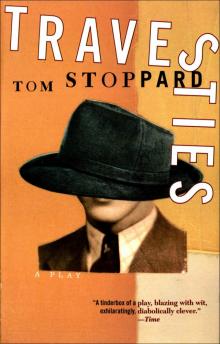 Travesties
Travesties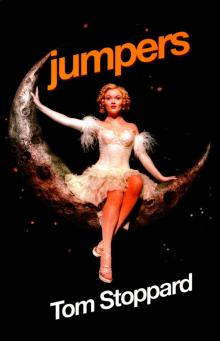 Jumpers
Jumpers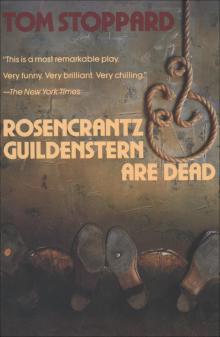 Rosencrantz and Guildenstern Are Dead
Rosencrantz and Guildenstern Are Dead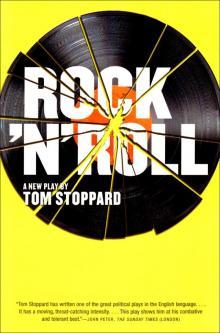 Rock 'N' Roll
Rock 'N' Roll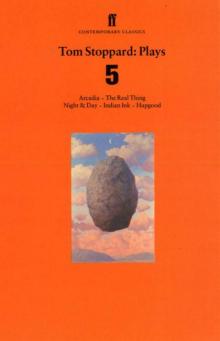 Plays 5
Plays 5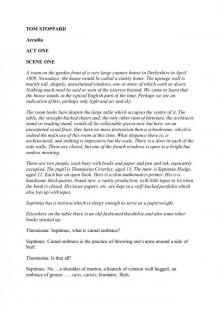 Arcadia
Arcadia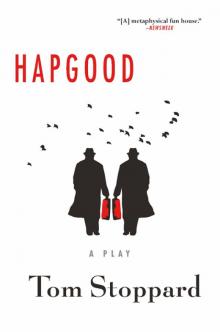 Hapgood
Hapgood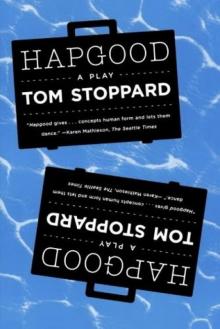 Hapgood: A Play
Hapgood: A Play Every Good Boy Deserves Favor & Professional Foul
Every Good Boy Deserves Favor & Professional Foul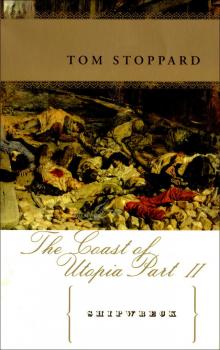 The Coast of Utopia: Voyage, Shipwreck, Salvage
The Coast of Utopia: Voyage, Shipwreck, Salvage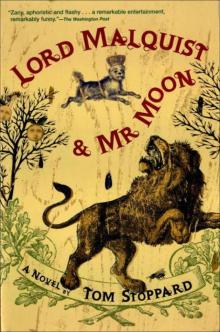 Lord Malquist & Mr. Moon
Lord Malquist & Mr. Moon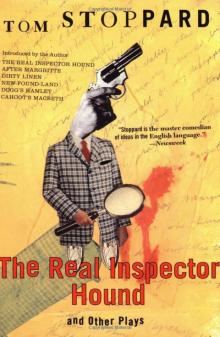 The Real Inspector Hound and Other Plays
The Real Inspector Hound and Other Plays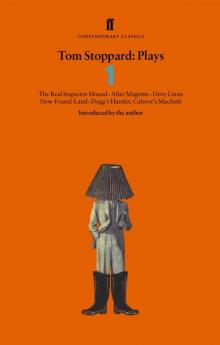 Tom Stoppard Plays 1
Tom Stoppard Plays 1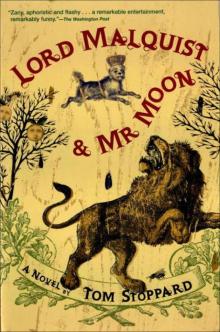 Lord Malquist & Mr. Moon: A Novel
Lord Malquist & Mr. Moon: A Novel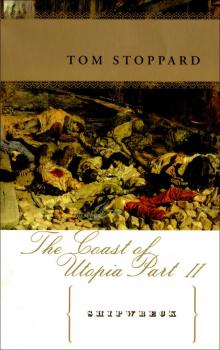 Shipwreck
Shipwreck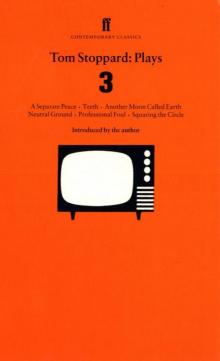 Tom Stoppard Plays 3
Tom Stoppard Plays 3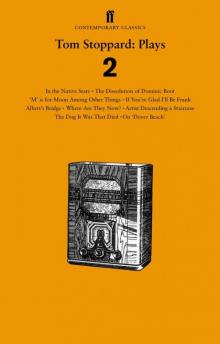 Tom Stoppard Plays 2
Tom Stoppard Plays 2 Rosencrantz and Guildenstern are dead. Arcadia
Rosencrantz and Guildenstern are dead. Arcadia